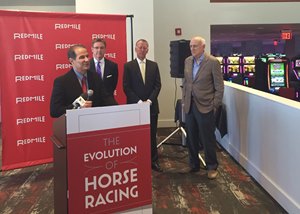Kentucky Industry Calls for Support of HHR Legislation


In preparing for what could be a close fight in the Kentucky General Assembly ahead of an expected Feb. 2 introduction of a bill to protect historical horse racing, supporters of the legislation gathered at Keeneland Feb. 1 to build some momentum.
Supporters at the evening meeting included industry leaders, the Kentucky Chamber of Commerce, U.S. Rep. Andy Barr, and Kentucky lawmakers, including State Sen. John Schickel (Republican, Union) who plans to introduce a bill protecting HHR Tuesday in the Senate Licensing and Occupations Committee, which he chairs.
Schickel expressed confidence the bill would advance out of committee by Feb. 4 but said a full effort will be needed once it's introduced on the Senate floor.
"We plan on moving very fairly swiftly," Schickel said. "That's why it's so important that we do our groundwork with our constituents and our senators. I look forward to it moving out of committee fairly quickly on Thursday. I think we've done our work there and most of the people that are on that committee tend to be supporters of the industry, so I think we're in really good shape.
"But it's once we get to the floor that we need to be sure. I feel really good about it in the Senate. I know it's a bigger challenge over in the other chamber, but I feel really good about it in the Senate but I don't want to take anything for granted. … This is a heavy, heavy lift."
The bill follows a Kentucky Supreme Court decision in September that determined at least one brand of HHR did not fit the state's current definition of pari-mutuel wagering. The games resemble slot machines, though their results are based on previously run horse races and their designers contend that payouts are pari-mutuel.
On Jan. 24, Keeneland and The Red Mile announced that they would temporarily close their joint HHR operation.
Speaking Monday evening at Keeneland, Rep. Adam Koenig (Republican, Erlanger) said he understands lawmakers who are concerned about problem gambling but thinks they also should be concerned about the potential loss of jobs in the racing and breeding industry—as well as in industries tied to racing and breeding if HHR is halted.
"When the opponents talk about (HHR) that it destroys families, well, how many families are going to get destroyed when they lose their job if this doesn't pass? Those are tangible jobs," Koenig said. "These are people working to try to better their lives, feed their family, have the dignity that goes along with work, and do not live off the government. I will take that any day over the people who want to tell us how we adults can and can't spend our money."
Senate Majority Floor Leader Damon Thayer (Republican, Georgetown) noted that while he's had his clashes with Gov. Andy Beshear (Democrat), they are on the same page when it comes to HHR. Gov. Behsear already has voiced his support for HHR, as has Senate President Robert Stivers (Republican, Manchester).
"There are legislators here tonight, Democrats and Republicans, rural, urban, and suburban, who are with us on this cause," Thayer said.
Sen. Thayer believes HHR has always been pari-mutuel and this legislation will remove any doubts. He and others noted that HHR has allowed the Kentucky industry to compete while being surrounded by states that allow casino gaming, sports wagering, or both.
"One area where I do agree with Governor Beshear is the need to make historical horse racing part of the definition of pari-mutuel wagering, just like live and simulcast racing," Thayer said. "So Senator Schickel is going to file the bill tomorrow."

The panel of lawmakers noted that it was important to act on this legislation—as jobs are already in place—before addressing any other gambling-related legislation. The lawmakers also noted that language in the bill will be very specific, as they want it clear that protecting HHR is the lone goal.
"There's a lot of legislators who are out there that I think we could possibly get their support if they know that we're not playing any games here. This isn't a gateway or anything like that," said Rep. Matt Koch (Republican, Paris.) "We kept this language very narrow, very tight. We're concerned about HHR right now."
After noting the economic impact that HHR has made throughout the commonwealth, Kentucky Chamber of Commerce president Ashli Watts noted that not protecting HHR would result in more lost jobs at a time Kentucky already has been hit hard by COVID-19.
"As of December, Kentucky now ranks 50th in work participation," Watts said. "The last thing we need to do is lose good-paying signature industry jobs in Kentucky."
Elisabeth Jensen, executive vice president of the Kentucky Equine Education Project, which advocates for the horse industry in the state, noted that it will be important to make contacts with lawmakers beyond Central Kentucky. She encouraged supporters with ties in the eastern and western parts of the state to reach out.
The KEEP website has information on how to contact lawmakers or sign a petition in support of HHR.
